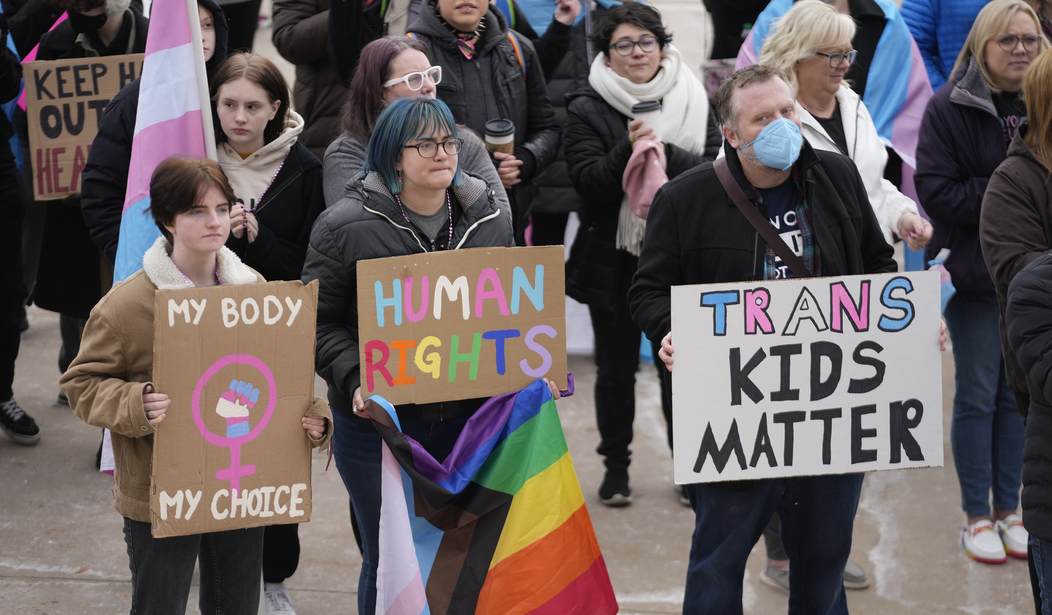In the ongoing debate over how to treat children suffering from gender dysphoria, folks on the left have touted the “gender-affirming care” approach, which involves the use of puberty blockers and surgical treatments instead of relying on talk therapy and other methods. Prominent leftists have claimed that the efficacy of this approach has been backed by numerous scientific studies.
Medical professionals have questioned these supposed studies, arguing that they do not offer definitive proof that “gender-affirming care” is the remedy that proponents say it is. A new study shows that these professionals are right.
The United Kingdom’s National Health Service published the findings of a study showing that “gender-affirming care” either has deleterious effects on children’s mental health or no effect whatsoever.
A third of trans children treated with puberty blockers had their mental health deteriorate while on the medication, a new analysis of a landmark study reveals.
The original study found that 44 children, aged 12 to 15, who took the controversial drugs experienced no change — good or bad — to their mental health.
This report, produced by experts from the NHS's Gender Identity Development Service (GIDS) at Tavistock and University College London Hospitals (UCLH) in 2021 eventually led to a lowering of the age children could access puberty blockers.
But a fresh analysis of the data used in the report found 34 per cent of the gender-questioning youth saw their mental health deteriorate while using the drugs.
This compared to 29 per cent who had their mental health improve and 37 per cent who experienced no change.
The initial study looked at averages of participants’ mental health over a year. This means that it did not adequately analyze the highs and lows experienced by individuals. The latest study conducted by Susan McPherson and David Freedman looked at individual scores, which allowed them to use a more granular approach to analyzing the impact of “gender-affirming care.” In this way, they were able to get a better sense of how individual patients fared.
To be fair, the sample size used in this study was relatively small, with 44 participants, and there was no control group. Still, the findings are compelling, especially when combined with other studies showing that “gender-affirming care” might do more harm than good when it comes to children’s mental health.
The study comes as the controversy over the use of puberty blockers and other medical treatments has intensified. Proponents argue that these treatments can be reversed if the patient has a change of heart and wishes to embrace their birth sex. Yet, other studies and the stories of detransitioners paint a different picture. Many report experiencing physical and mental effects of the puberty blockers even after they stop taking them.
The United Kingdom recently issued guidance instructing medical professionals to move away from the “gender-affirming care” model, which will now only be used in clinical trials to study its effects. It is one of several European nations to pull away from using this method after seeing how it has negatively impacted children – especially after they become adults.
The findings have also been shared with Dr Hilary Cass, who is currently conducting the independent review of gender identity services for children and young people.
In February 2022, [s]he published his interim report into children’s gender services, which found “gaps in evidence” around the use of puberty blockers.
The research has been welcomed by the hospital trusts in helping to support young people transitioning.
A UCLH spokesman said: “We fully support Dr Hilary Cass’s recommendation that research should be fully embedded in the development of new services for children and young people expressing gender diversity.
“We also support the proposal that puberty suppressing hormones should only be available as part of a clinical research study with the relevant scientific and ethical approvals.
“We welcome contributions to the evidence base around medical intervention for young people expressing gender incongruence and we will work closely with the new national Research Oversight Board to support the collection and analysis of robust data in this area.”
As more time passes and more studies are conducted, it seems even more likely that the pernicious impact of “gender-affirming care” will be exposed. More medical professionals might challenge the prevailing narrative about the method. Folks on the left will undoubtedly try to suppress these studies and those highlighting them, just as they currently do with media outlets and public figures who denounce “gender-affirming care.”
Still, it will be more difficult to conceal the truth about this practice as more detransitioners come out of the woodwork, filing lawsuits and telling their stories publicly. It will still take more time for this to happen, and, unfortunately, many more kids will likely be victimized by this medical trend. But as more Americans wake up to this reality and come to realize that this could happen to their children, the tide will begin to turn.
Related: Our Media Commit the Sin of Omission Regarding Youth Transgender Issues – Reality Emerges in Britain













